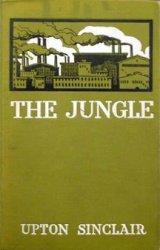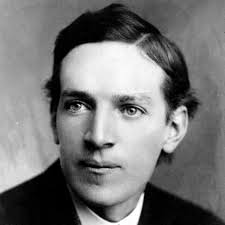The Jungle Page #29
The Jungle is a 1906 novel by the American journalist and novelist Upton Sinclair. Sinclair wrote the novel to portray the harsh conditions and exploited lives of immigrants in the United States in Chicago and similar industrialized cities.
Chapter 8 Yet even by this deadly winter the germ of hope was not to be kept from sprouting in their hearts. It was just at this time that the great adventure befell Marija. The victim was Tamoszius Kuszleika, who played the violin. Everybody laughed at them, for Tamoszius was petite and frail, and Marija could have picked him up and carried him off under one arm. But perhaps that was why she fascinated him; the sheer volume of Marija's energy was overwhelming. That first night at the wedding Tamoszius had hardly taken his eyes off her; and later on, when he came to find that she had really the heart of a baby, her voice and her violence ceased to terrify him, and he got the habit of coming to pay her visits on Sunday afternoons. There was no place to entertain company except in the kitchen, in the midst of the family, and Tamoszius would sit there with his hat between his knees, never saying more than half a dozen words at a time, and turning red in the face before he managed to say those; until finally Jurgis would clap him upon the back, in his hearty way, crying, “Come now, brother, give us a tune.” And then Tamoszius' face would light up and he would get out his fiddle, tuck it under his chin, and play. And forthwith the soul of him would flame up and become eloquent--it was almost an impropriety, for all the while his gaze would be fixed upon Marija's face, until she would begin to turn red and lower her eyes. There was no resisting the music of Tamoszius, however; even the children would sit awed and wondering, and the tears would run down Teta Elzbieta's cheeks. A wonderful privilege it was to be thus admitted into the soul of a man of genius, to be allowed to share the ecstasies and the agonies of his inmost life. Then there were other benefits accruing to Marija from this friendship--benefits of a more substantial nature. People paid Tamoszius big money to come and make music on state occasions; and also they would invite him to parties and festivals, knowing well that he was too good-natured to come without his fiddle, and that having brought it, he could be made to play while others danced. Once he made bold to ask Marija to accompany him to such a party, and Marija accepted, to his great delight--after which he never went anywhere without her, while if the celebration were given by friends of his, he would invite the rest of the family also. In any case Marija would bring back a huge pocketful of cakes and sandwiches for the children, and stories of all the good things she herself had managed to consume. She was compelled, at these parties, to spend most of her time at the refreshment table, for she could not dance with anybody except other women and very old men; Tamoszius was of an excitable temperament, and afflicted with a frantic jealousy, and any unmarried man who ventured to put his arm about the ample waist of Marija would be certain to throw the orchestra out of tune. It was a great help to a person who had to toil all the week to be able to look forward to some such relaxation as this on Saturday nights. The family was too poor and too hardworked to make many acquaintances; in Packingtown, as a rule, people know only their near neighbors and shopmates, and so the place is like a myriad of little country villages. But now there was a member of the family who was permitted to travel and widen her horizon; and so each week there would be new personalities to talk about,--how so-and-so was dressed, and where she worked, and what she got, and whom she was in love with; and how this man had jilted his girl, and how she had quarreled with the other girl, and what had passed between them; and how another man beat his wife, and spent all her earnings upon drink, and pawned her very clothes. Some people would have scorned this talk as gossip; but then one has to talk about what one knows. It was one Saturday night, as they were coming home from a wedding, that Tamoszius found courage, and set down his violin case in the street and spoke his heart; and then Marija clasped him in her arms. She told them all about it the next day, and fairly cried with happiness, for she said that Tamoszius was a lovely man. After that he no longer made love to her with his fiddle, but they would sit for hours in the kitchen, blissfully happy in each other's arms; it was the tacit convention of the family to know nothing of what was going on in that corner. They were planning to be married in the spring, and have the garret of the house fixed up, and live there. Tamoszius made good wages; and little by little the family were paying back their debt to Marija, so she ought soon to have enough to start life upon--only, with her preposterous softheartedness, she would insist upon spending a good part of her money every week for things which she saw they needed. Marija was really the capitalist of the party, for she had become an expert can painter by this time--she was getting fourteen cents for every hundred and ten cans, and she could paint more than two cans every minute. Marija felt, so to speak, that she had her hand on the throttle, and the neighborhood was vocal with her rejoicings. Yet her friends would shake their heads and tell her to go slow; one could not count upon such good fortune forever--there were accidents that always happened. But Marija was not to be prevailed upon, and went on planning and dreaming of all the treasures she was going to have for her home; and so, when the crash did come, her grief was painful to see. For her canning factory shut down! Marija would about as soon have expected to see the sun shut down--the huge establishment had been to her a thing akin to the planets and the seasons. But now it was shut! And they had not given her any explanation, they had not even given her a day's warning; they had simply posted a notice one Saturday that all hands would be paid off that afternoon, and would not resume work for at least a month! And that was all that there was to it--her job was gone! It was the holiday rush that was over, the girls said in answer to Marija's inquiries; after that there was always a slack. Sometimes the factory would start up on half time after a while, but there was no telling--it had been known to stay closed until way into the summer. The prospects were bad at present, for truckmen who worked in the storerooms said that these were piled up to the ceilings, so that the firm could not have found room for another week's output of cans. And they had turned off three-quarters of these men, which was a still worse sign, since it meant that there were no orders to be filled. It was all a swindle, can-painting, said the girls--you were crazy with delight because you were making twelve or fourteen dollars a week, and saving half of it; but you had to spend it all keeping alive while you were out, and so your pay was really only half what you thought.
Translation
Translate and read this book in other languages:
Select another language:
- - Select -
- 简体中文 (Chinese - Simplified)
- 繁體中文 (Chinese - Traditional)
- Español (Spanish)
- Esperanto (Esperanto)
- 日本語 (Japanese)
- Português (Portuguese)
- Deutsch (German)
- العربية (Arabic)
- Français (French)
- Русский (Russian)
- ಕನ್ನಡ (Kannada)
- 한국어 (Korean)
- עברית (Hebrew)
- Gaeilge (Irish)
- Українська (Ukrainian)
- اردو (Urdu)
- Magyar (Hungarian)
- मानक हिन्दी (Hindi)
- Indonesia (Indonesian)
- Italiano (Italian)
- தமிழ் (Tamil)
- Türkçe (Turkish)
- తెలుగు (Telugu)
- ภาษาไทย (Thai)
- Tiếng Việt (Vietnamese)
- Čeština (Czech)
- Polski (Polish)
- Bahasa Indonesia (Indonesian)
- Românește (Romanian)
- Nederlands (Dutch)
- Ελληνικά (Greek)
- Latinum (Latin)
- Svenska (Swedish)
- Dansk (Danish)
- Suomi (Finnish)
- فارسی (Persian)
- ייִדיש (Yiddish)
- հայերեն (Armenian)
- Norsk (Norwegian)
- English (English)
Citation
Use the citation below to add this book to your bibliography:
Style:MLAChicagoAPA
"The Jungle Books." Literature.com. STANDS4 LLC, 2025. Web. 6 Mar. 2025. <https://www.literature.com/book/the_jungle_272>.








Discuss this The Jungle book with the community:
Report Comment
We're doing our best to make sure our content is useful, accurate and safe.
If by any chance you spot an inappropriate comment while navigating through our website please use this form to let us know, and we'll take care of it shortly.
Attachment
You need to be logged in to favorite.
Log In